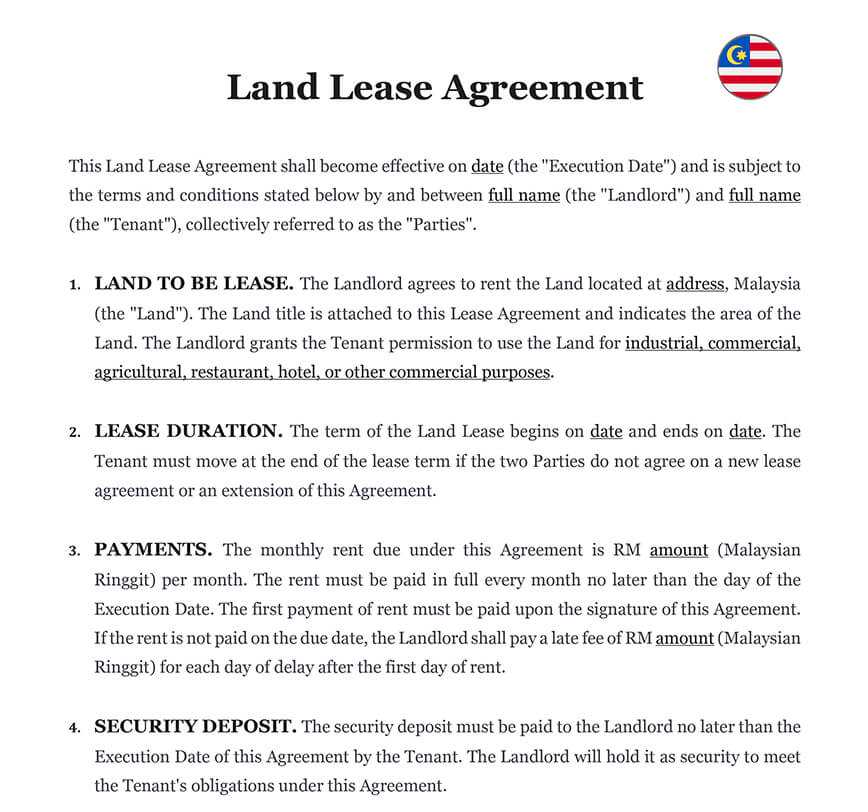Ready to use legal template
Drafted by experienced lawyers
Chinese-English translation
Ready to use legal template
Drafted by lawyers
Chinese-English translation
Home › Rent your property › Land lease agreement
Learn more about Land Lease Agreement in China
A Land Lease Agreement is a legally binding contract that grants a tenant the right to use a piece of land for a specified period in exchange for rent. This agreement is essential for businesses, investors, and individuals leasing land for commercial, industrial, agricultural, or residential purposes. In China, land lease agreements are particularly important due to land ownership laws, where the state or collectives retain ownership while granting leasehold rights. At Themis Partner, we provide a comprehensive Land Lease Agreement template, fully compliant with Chinese regulations. Our template is easy to edit in Word format and includes a certified translation in both English and Mandarin for seamless use. Download now to secure your lease agreement with confidence.
Table of contents
-
What is a Land Lease Agreement in China?
-
What is included in this Land Lease Agreement?
-
How long can a Land Lease Agreement last in China?
-
Can a Land Lease Agreement be renewed or transferred?
-
Can a foreign company sign a Lease Agreement in China?
-
What restrictions apply to industrial land leases in China?
-
Does a Land Lease Agreement need to be registered?
-
What are the tax implications of a Land Lease Contract?
-
How can a Land Lease Agreement be terminated in China?
What is a Land Lease Agreement in China?
A Land Lease Agreement in China is a formal contract in which a landlord, often the state or a collective entity, grants a tenant the right to use a specific parcel of land for a predetermined period. The agreement establishes the rights and responsibilities of both parties, including lease duration, rent payments, land usage regulations, tax obligations, and termination clauses. If you are looking to rent out residential property in China, you can refer to our Lease Agreement.
Leasing land is the only legal way for businesses and individuals to acquire land-use rights in China. Whether for residential, commercial, or industrial purposes, the agreement ensures compliance with Chinese property laws. It also provides legal protection for both the landlord and tenant, preventing unauthorized use or disputes over land rights. For official regulations, visit the Ministry of Natural Resources of China.
What is included in this Land Lease Agreement?
A Land Lease Agreement in China includes several essential clauses that define the terms and conditions of the lease.
| ➤ Land to be leased: The agreement specifies the location of the land, including the address and title deed details. It defines the size and permitted use of the land, which could be for commercial, agricultural, or industrial purposes. The tenant must comply with Chinese zoning and land-use laws, ensuring that the land is used for legally permitted activities. |
| ➤ Lease duration: The lease term is clearly defined, specifying the start and end dates. Renewal options depend on mutual agreement between the landlord and tenant. If the lease is renewed, the new agreement must be registered with the Chinese Land Administration Bureau within 30 days. |
| ➤ Payments: Rent is payable in Chinese Yuan (CNY) and is usually due monthly on an agreed date. Late payments incur penalty fees in accordance with Chinese contract law. The first payment is typically due upon signing the agreement. |
| ➤ Security Deposit: A refundable security deposit, usually equal to two months’ rent, is required to cover potential damages or unpaid dues. The deposit is returned within 30 days after lease termination, following any necessary deductions. If damages exceed the deposit amount, the tenant is responsible for covering the additional costs. |
| ➤ Term and Conditions: The tenant must obtain written consent from the landlord before making any alterations to the land, installing equipment, or constructing buildings. Any modifications must comply with Chinese safety and environmental regulations. At the end of the lease, the tenant may be required to restore the land to its original condition if requested by the landlord. |
| ➤ Taxes: The tenant is responsible for paying land-use taxes and other related fees, which may be treated as additional rent. Tax obligations are governed by Chinese taxation laws and must be settled promptly to avoid legal consequences. |
| ➤ Transfer of lease: The lease cannot be assigned, sublet, or transferred to another party without the landlord’s prior written consent. Unauthorized transfers may result in lease termination and legal action under Chinese property laws. |
| ➤ Breach of contract: If either party fails to fulfill their obligations, the defaulting party may receive a notice to remedy the breach. If the issue is not resolved within the specified timeframe, the other party has the right to terminate the lease and seek compensation as per Chinese Contract Law |
| ➤ Termination:The landlord has the right to terminate the lease if the tenant fails to pay rent, uses the land for unauthorized purposes, or violates other terms of the agreement. In such cases, the landlord may forfeit the security deposit and seek further compensation for losses incurred. |
| ➤ Governing Law and Juridictions:The agreement is governed by Chinese law, and any disputes are resolved through arbitration or within the jurisdiction of Chinese courts. |




